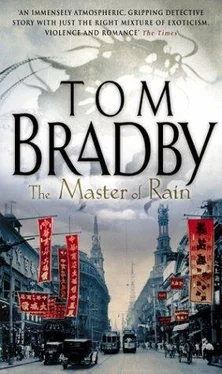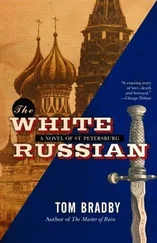Return to house is between five minutes and ten minutes past two. Lu goes in and stays until evening, when he leaves the house three to four times a week. He goes to the Majestic or another nightclub. Or one of his private clubs or residences. He usually returns between three and four in the morning.
Field folded the report and slipped it into his pocket.
“It’s the social butterfly,” Caprisi said easily as Field went into the Crime Branch. “You’ve been spotted leaving the race club with the wife of the municipal secretary.”
“She’s my aunt.”
“Of course she is.”
Macleod smiled indulgently, fiddling with the chain around his neck. Field heard a rustle behind him and turned. Chen stood there, his hands in his raincoat pockets, wearing an expression that could have indicated anything from warmth to outright hostility.
“The prints are missing,” Field said.
Caprisi’s brow furrowed.
“I told you that the results were up, and when I returned here after the game, they were still on my desk, but I went to the toilet and when I came back-”
“They were gone,” Caprisi finished.
All three men stared at Field.
“The originals have disappeared from the lab, and Ellis has gone on holiday to San Francisco until the autumn.”
“You couldn’t have mislaid them?” Macleod asked.
“No.”
“No one left a note saying they’d taken them?”
“No.”
Caprisi and Macleod stared at the floor. Their silence was, Field thought, imbued with suspicion. A new wave of resentment prevented him from offering any further explanation.
An old woman came in, bent low, an apron around her waist. She stopped in front of Chen and asked him, in English, whether anyone wanted tea. Field and Caprisi nodded. The other two shook their heads.
“What did you find out yesterday?” Caprisi asked.
Field took out his cigarettes, lit one, and offered them around. They all refused. Field recalled Caprisi telling him that all physical evidence should be given to him and kept outside the precinct and felt stupid again for not having acted upon this advice.
“There are two other similar cases,” Field said. “Natalya Simonov on May 1 and Irina Ignatiev at the end of March. Both women lived on Avenue Joffre, but I cannot find a house number for either. Irina was definitely one of Lu’s girls, and Natalya may also have been. I looked for the report card on Natalya Simonov, but it was missing. I know one was filed, because the numbers skipped. So I checked the incident book and found it there. I worked backwards, until I found the Ignatiev case, but the book didn’t go any further back than March.”
There was a long silence.
“If we apply to the French, is there any chance they will share information on the latest murder, at least?”
Caprisi shook his head. “They’ll say it was a domestic. And if we apply formally, we show our hand.” He rubbed the bridge of his nose. “We’ve arranged to see Lu this morning and the manager of the Fraser’s factory this afternoon.”
“There is clearly a pattern,” Field said. “If we can find out where these other girls lived, there may be evidence from their neighbors that would prove more conclusive.”
“Lu is challenging us,” Macleod said. “Whether he has intended it or not, this is a head-on confrontation. We all know the French police are entirely in his pocket, but the Orlov murder is a challenge to us. If he did not murder the girl himself, he is certainly protecting whoever did, and if we let him get away with it, we might as well hang up our boots and go home.”
They were silent again as they contemplated Macleod’s wisdom. To Field, it had seemed like a speech to a larger audience. Macleod was even more withdrawn today, and Field wondered if ambition, and the proximity of the decision on the new commissioner, were beginning to take their toll.
The Chinese woman brought in the mugs of tea on a battered metal tray. Field thought briefly of the fine, polished silver of the country club and the Donaldsons’ house in Crane Road. Although it was too hot to drink comfortably, the smell of the tea alone made him feel a little better.
“It is Monday,” Caprisi said. “The shipment mentioned in Lena’s notes is on Saturday.”
“And?” Macleod asked.
“We know Lena had a reason to make a note of this shipment, but after that’s gone…” He shrugged. “The lead will then be lost.”
The American looked at Field again.
“Sewing machines?” Macleod asked.
“Yes.”
“I still don’t see the bloody relevance.”
“We can’t see any, either.” Chen took Field’s cigarette, leaned over to the cubicle beside Caprisi’s, and stubbed it out, half closing his eyes as the smoke twisted up into his face. “The captain of the ship is still lost down Blood Alley. The machines are made by an electrical company. I could see nothing unusual about them. They’re just… sewing machines.” He put his hands back in his pockets.
“The manager is British?” Macleod asked.
“Scottish.”
Macleod scowled, not certain if this was a joke. “It’s a Fraser’s company?”
“Yes,” Caprisi said.
“Field can arrange an audience with Charlie Lewis.” Macleod looked at him, then smiled for the first time. “Lighten up, man. I’m pulling your leg.”
Caprisi sipped his tea. “We should talk to Lewis.”
“We should find out where these women lived,” Field interjected.
They stared at him, frowning at the truculence in his voice.
“One step at a time, Field,” Caprisi said.
“We could send some plainclothes officers down to do door-to-door.”
“Avenue Joffre is at least three miles long. And you think the French won’t get wind of a door-to-door?” He shook his head. “One step at a time.”
Chen went ahead to get the car. Field walked to the toilet and confronted his bloodshot eyes and tired face in the mirror while he washed his hands.
Caprisi was waiting in the corridor outside, holding a large white box. He handed it to him. Field took off the top and pulled out the gray suit. He put the box down. The jacket was beautifully made and many times lighter than his current one. “My God.”
“My Chinese tailor.”
“Thank you.”
“Put it on. You’ll feel better.” Caprisi bent down and took out two shirts wrapped in tissue paper. “Thought you might need these.”
Field pulled back the wrapping and felt the quality of the cotton.
Caprisi bent down once more. “And a decent silk tie.”
“I don’t know what to say.”
“Then don’t say anything.”
“If we can go down to the bank, I can pay you straightaway. I’ve got money now and-”
“It’s on me.”
“Don’t be ridiculous.”
Caprisi shook his head. “It’s my pleasure.”
“I can’t allow-”
“Fortunately, you don’t know how much it cost.”
“But it’s too generous.”
“I can’t watch you melting in this heat anymore, polar bear.”
“But I have the money.”
Caprisi was shaking his head and waving his hand.
Field sighed. “Thanks, Caprisi.” He looked at him. “Thanks.”
“Don’t mention it.” The American smiled. “Isn’t that what you English say? Don’t mention it.”
Field smiled and looked down again at the jacket in his hand.
“Put it on, polar bear.”
Field went back into the toilet to get changed, and emerged transformed.
Caprisi whistled. “Wait till they see you down at the Majestic, kid.”
They got into the lift together. Field had begun to worry that the American would have got the wrong impression about the money. He suddenly wondered if it had been appallingly naive to imagine that any supplement could be legitimate and straightforward. “Who would put cash into my account without my knowledge? Is it-could it be an official thing?”
Читать дальше












